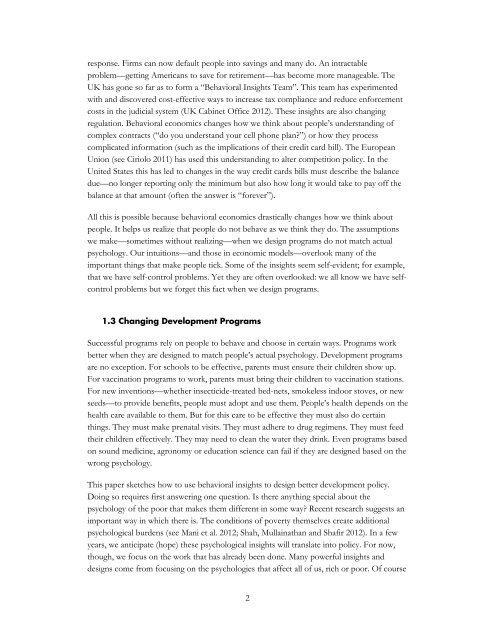1426679 file datta mullainathan behavioral design
1426679 file datta mullainathan behavioral design
1426679 file datta mullainathan behavioral design
Create successful ePaper yourself
Turn your PDF publications into a flip-book with our unique Google optimized e-Paper software.
esponse. Firms can now default people into savings and many do. An intractable<br />
problem—getting Americans to save for retirement—has become more manageable. The<br />
UK has gone so far as to form a “Behavioral Insights Team”. This team has experimented<br />
with and discovered cost-effective ways to increase tax compliance and reduce enforcement<br />
costs in the judicial system (UK Cabinet Office 2012). These insights are also changing<br />
regulation. Behavioral economics changes how we think about people’s understanding of<br />
complex contracts (“do you understand your cell phone plan?”) or how they process<br />
complicated information (such as the implications of their credit card bill). The European<br />
Union (see Ciriolo 2011) has used this understanding to alter competition policy. In the<br />
United States this has led to changes in the way credit cards bills must describe the balance<br />
due—no longer reporting only the minimum but also how long it would take to pay off the<br />
balance at that amount (often the answer is “forever”).<br />
All this is possible because <strong>behavioral</strong> economics drastically changes how we think about<br />
people. It helps us realize that people do not behave as we think they do. The assumptions<br />
we make—sometimes without realizing—when we <strong>design</strong> programs do not match actual<br />
psychology. Our intuitions—and those in economic models—overlook many of the<br />
important things that make people tick. Some of the insights seem self-evident; for example,<br />
that we have self-control problems. Yet they are often overlooked: we all know we have selfcontrol<br />
problems but we forget this fact when we <strong>design</strong> programs.<br />
1.3 Changing Development Programs<br />
Successful programs rely on people to behave and choose in certain ways. Programs work<br />
better when they are <strong>design</strong>ed to match people’s actual psychology. Development programs<br />
are no exception. For schools to be effective, parents must ensure their children show up.<br />
For vaccination programs to work, parents must bring their children to vaccination stations.<br />
For new inventions—whether insecticide-treated bed-nets, smokeless indoor stoves, or new<br />
seeds—to provide benefits, people must adopt and use them. People’s health depends on the<br />
health care available to them. But for this care to be effective they must also do certain<br />
things. They must make prenatal visits. They must adhere to drug regimens. They must feed<br />
their children effectively. They may need to clean the water they drink. Even programs based<br />
on sound medicine, agronomy or education science can fail if they are <strong>design</strong>ed based on the<br />
wrong psychology.<br />
This paper sketches how to use <strong>behavioral</strong> insights to <strong>design</strong> better development policy.<br />
Doing so requires first answering one question. Is there anything special about the<br />
psychology of the poor that makes them different in some way? Recent research suggests an<br />
important way in which there is. The conditions of poverty themselves create additional<br />
psychological burdens (see Mani et al. 2012; Shah, Mullainathan and Shafir 2012). In a few<br />
years, we anticipate (hope) these psychological insights will translate into policy. For now,<br />
though, we focus on the work that has already been done. Many powerful insights and<br />
<strong>design</strong>s come from focusing on the psychologies that affect all of us, rich or poor. Of course<br />
2


